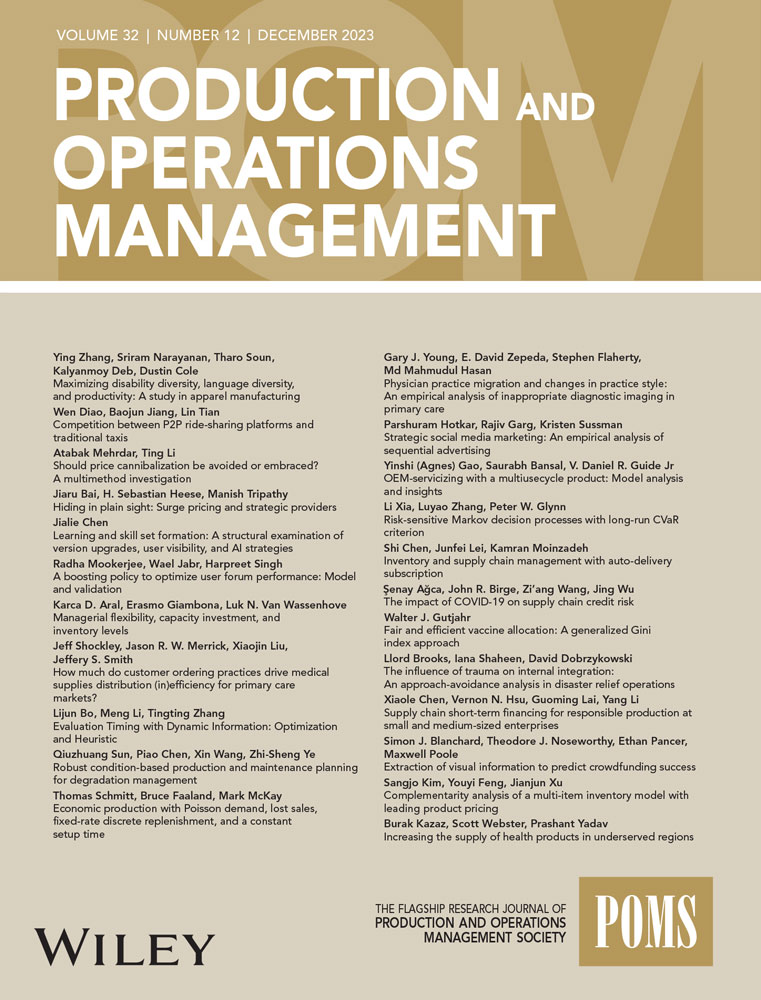管理预售与两次付款和退货政策,当消费者的时间不一致
IF 5.1
3区 管理学
Q1 ENGINEERING, MANUFACTURING
引用次数: 1
摘要
我们考虑一家公司使用两种付款方式进行预售——包括预付款和延期付款——在各种退货政策下向时间不一致的消费者销售产品。随着时间的推移,消费者决定是否通过预付押金的方式预订产品,是否在到期日之前通过支付欠款的方式结算余额,以及在允许退货的情况下,是否在发现产品适合度后退回全额退款。在未结清余额或未按时结清余额前取消预订会导致定金支付人丢失定金。消费者使用准双曲线折扣来衡量跨期效用,并在做出购买决定时表现出时间不一致性。我们的研究结果表明,随着消费者的时间不一致性减弱,公司管理存款和拖欠,以诱导没有,一些和所有的存款支付者,在那个顺序,结算余额。它对企业利润和消费者剩余的影响是混合的,但总是由于实际销售额的增加而导致社会福利的改善。对于退货政策的选择,当消费者时间不一致时,企业倾向于全额退货,而消费者倾向于不退货;当消费者具有时间一致性时,他们有相似的偏好。此外,我们发现消费者的不平衡(由时间不一致的偏好引起)不太可能发生,因为消费者更成熟,预售期缩短,产品价值增加,或者产品更有可能是一个很好的契合。此外,允许全额付款但尚未交付的产品快速退款可以完全阻止不平衡,而这种选择损害了公司,也可能对消费者有利,也可能不利于消费者。所有这些都产生了新颖的见解,管理预售与两个付款和回报,当消费者是时间不一致的。这篇文章受版权保护。版权所有本文章由计算机程序翻译,如有差异,请以英文原文为准。
Managing presales with two payments and return policy when consumers are time‐inconsistent
We consider a firm using presales with two payments – including an upfront deposit and a postponed arrear – to sell a product to time‐inconsistent consumers under various return policies. With the passage of time, consumers decide whether to preorder the product by paying the deposit, whether to settle the balance by paying the arrear by the due date, and, when returns are allowed, whether to return a fully paid product for a refund after its fitness is revealed. Canceling a preorder before settling the balance or failing to settle the balance on time causes a deposit payer to lose deposit. Consumers use quasi‐hyperbolic discounting to weigh intertemporal utilities and exhibit time‐inconsistency when making purchase decisions. Our results indicate that, as consumers' time‐inconsistency weakens, the firm manages the deposit and the arrear to induce no, some, and all deposit payers, in that sequence, to settle the balance. It has mixed effects on the profit of the firm and consumer surplus, but always causes social welfare to improve since actual sales increase. Regarding the choice of return policy, the firm prefers full returns while consumers prefer no returns when consumers are time‐inconsistent; they share similar preferences when consumers are time‐consistent. Moreover, we find that consumers' imbalance (caused by time‐inconsistent preference) is less likely to occur as consumers are more sophisticated, as the presales period shortens, as the product value increases, or as the product is more likely to be a good fit. In addition, allowing a quick refund for fully paid but not yet delivered products can completely deter imbalance, while this option harms the firm and may or may not benefit consumers. All this yields novel insights into managing presales with two payments and returns when consumers are time‐inconsistent.This article is protected by copyright. All rights reserved
求助全文
通过发布文献求助,成功后即可免费获取论文全文。
去求助
来源期刊

Production and Operations Management
管理科学-工程:制造
CiteScore
7.50
自引率
16.00%
发文量
278
审稿时长
24 months
期刊介绍:
The mission of Production and Operations Management is to serve as the flagship research journal in operations management in manufacturing and services. The journal publishes scientific research into the problems, interest, and concerns of managers who manage product and process design, operations, and supply chains. It covers all topics in product and process design, operations, and supply chain management and welcomes papers using any research paradigm.
 求助内容:
求助内容: 应助结果提醒方式:
应助结果提醒方式:


